Sharid Loáiciga
Diacritic Restoration for Low-Resource Indigenous Languages: Case Study with Bribri and Cook Islands Māori
Dec 22, 2025Abstract:We present experiments on diacritic restoration, a form of text normalization essential for natural language processing (NLP) tasks. Our study focuses on two extremely under-resourced languages: Bribri, a Chibchan language spoken in Costa Rica, and Cook Islands Māori, a Polynesian language spoken in the Cook Islands. Specifically, this paper: (i) compares algorithms for diacritics restoration in under-resourced languages, including tonal diacritics, (ii) examines the amount of data required to achieve target performance levels, (iii) contrasts results across varying resource conditions, and (iv) explores the related task of diacritic correction. We find that fine-tuned, character-level LLMs perform best, likely due to their ability to decompose complex characters into their UTF-8 byte representations. In contrast, massively multilingual models perform less effectively given our data constraints. Across all models, reliable performance begins to emerge with data budgets of around 10,000 words. Zero-shot approaches perform poorly in all cases. This study responds both to requests from the language communities and to broader NLP research questions concerning model performance and generalization in under-resourced contexts.
Coreference as an indicator of context scope in multimodal narrative
Mar 07, 2025Abstract:We demonstrate that large multimodal language models differ substantially from humans in the distribution of coreferential expressions in a visual storytelling task. We introduce a number of metrics to quantify the characteristics of coreferential patterns in both human- and machine-written texts. Humans distribute coreferential expressions in a way that maintains consistency across texts and images, interleaving references to different entities in a highly varied way. Machines are less able to track mixed references, despite achieving perceived improvements in generation quality.
Understanding and Analyzing Model Robustness and Knowledge-Transfer in Multilingual Neural Machine Translation using TX-Ray
Dec 18, 2024Abstract:Neural networks have demonstrated significant advancements in Neural Machine Translation (NMT) compared to conventional phrase-based approaches. However, Multilingual Neural Machine Translation (MNMT) in extremely low-resource settings remains underexplored. This research investigates how knowledge transfer across languages can enhance MNMT in such scenarios. Using the Tatoeba translation challenge dataset from Helsinki NLP, we perform English-German, English-French, and English-Spanish translations, leveraging minimal parallel data to establish cross-lingual mappings. Unlike conventional methods relying on extensive pre-training for specific language pairs, we pre-train our model on English-English translations, setting English as the source language for all tasks. The model is fine-tuned on target language pairs using joint multi-task and sequential transfer learning strategies. Our work addresses three key questions: (1) How can knowledge transfer across languages improve MNMT in extremely low-resource scenarios? (2) How does pruning neuron knowledge affect model generalization, robustness, and catastrophic forgetting? (3) How can TX-Ray interpret and quantify knowledge transfer in trained models? Evaluation using BLEU-4 scores demonstrates that sequential transfer learning outperforms baselines on a 40k parallel sentence corpus, showcasing its efficacy. However, pruning neuron knowledge degrades performance, increases catastrophic forgetting, and fails to improve robustness or generalization. Our findings provide valuable insights into the potential and limitations of knowledge transfer and pruning in MNMT for extremely low-resource settings.
A surprisal oracle for when every layer counts
Dec 04, 2024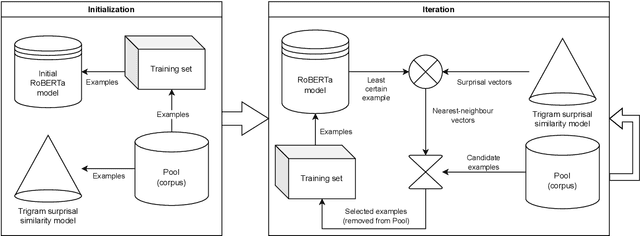
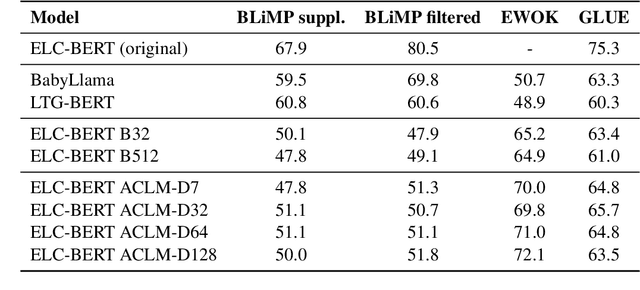
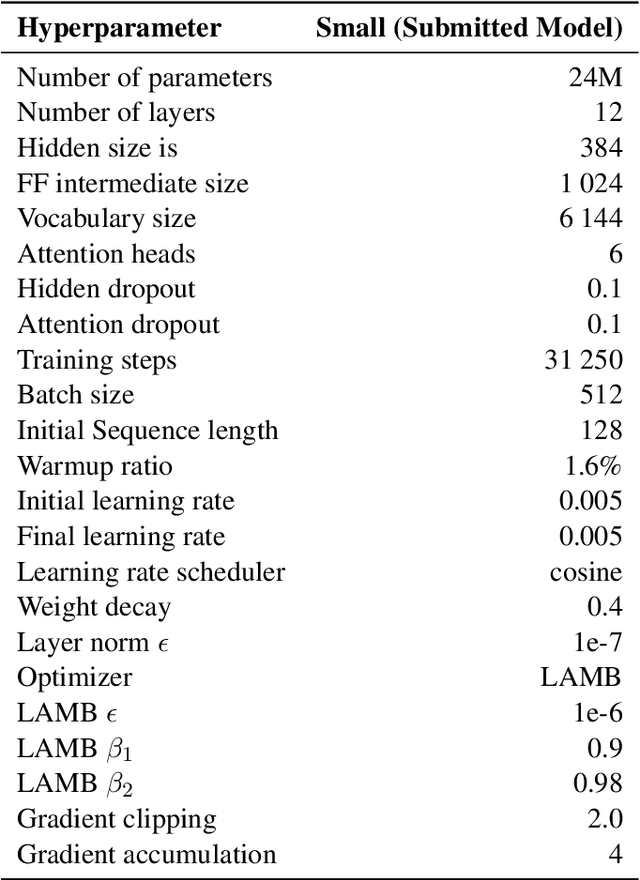
Abstract:Active Curriculum Language Modeling (ACLM; Hong et al., 2023) is a learner directed approach to training a language model. We proposed the original version of this process in our submission to the BabyLM 2023 task, and now we propose an updated ACLM process for the BabyLM 2024 task. ACLM involves an iteratively- and dynamically-constructed curriculum informed over the training process by a model of uncertainty; other training items that are similarly uncertain to a least certain candidate item are prioritized. Our new process improves the similarity model so that it is more dynamic, and we run ACLM over the most successful model from the BabyLM 2023 task: ELC-BERT (Charpentier and Samuel, 2023). We find that while our models underperform on fine-grained grammatical inferences, they outperform the BabyLM 2024 official base-lines on common-sense and world-knowledge tasks. We make our code available at https: //github.com/asayeed/ActiveBaby.
Unsupervised Discovery of Unaccusative and Unergative Verbs
Nov 01, 2021

Abstract:We present an unsupervised method to detect English unergative and unaccusative verbs. These categories allow us to identify verbs participating in the causative-inchoative alternation without knowing the semantic roles of the verb. The method is based on the generation of intransitive sentence variants of candidate verbs and probing a language model. We obtained results on par with similar approaches, with the added benefit of not relying on annotated resources.
Is Incoherence Surprising? Targeted Evaluation of Coherence Prediction from Language Models
May 07, 2021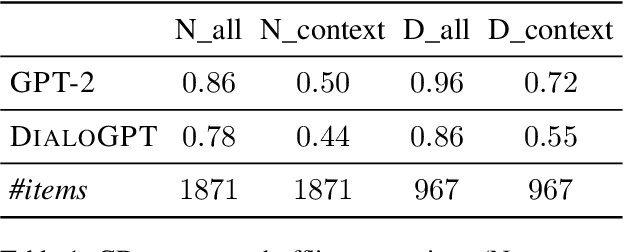
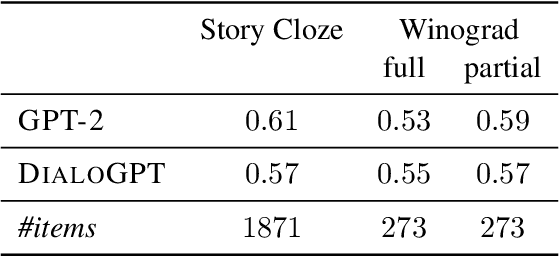
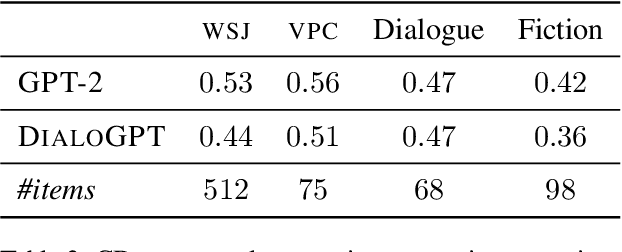
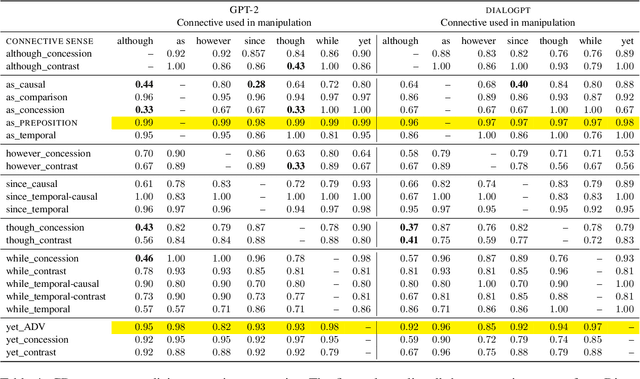
Abstract:Coherent discourse is distinguished from a mere collection of utterances by the satisfaction of a diverse set of constraints, for example choice of expression, logical relation between denoted events, and implicit compatibility with world-knowledge. Do neural language models encode such constraints? We design an extendable set of test suites addressing different aspects of discourse and dialogue coherence. Unlike most previous coherence evaluation studies, we address specific linguistic devices beyond sentence order perturbations, allowing for a more fine-grained analysis of what constitutes coherence and what neural models trained on a language modelling objective do encode. Extending the targeted evaluation paradigm for neural language models (Marvin and Linzen, 2018) to phenomena beyond syntax, we show that this paradigm is equally suited to evaluate linguistic qualities that contribute to the notion of coherence.
 Add to Chrome
Add to Chrome Add to Firefox
Add to Firefox Add to Edge
Add to Edge